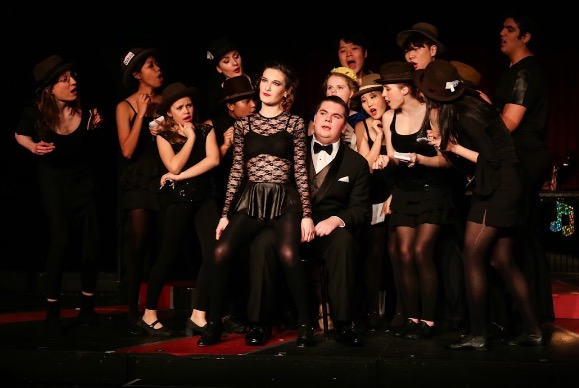Chicago: the Carmagnole of corruption, revenge and fame
March 13, 2016
Black walls, black floor, black ladders at the side of the stage. The theater seemed to be filled with a sense of cruelty — like the town of Chicago, always tough and violent.
This is the musical Chicago, which debuted in 1975 with music by John Kander, lyrics by Fred Ebb, and book by Ebb and Bob Fosse. Directed by Becky Beth Benedict with assistance from Angie Muzzy and Asia Meirovich, the show took place in the Little Theatre on March 4th, 5th, and 6th. It is a story of women. They are murderesses, they are victims; they are guilty, they are innocent. Whoever they are, they compete for fame to a point of recklessness.
It is all that jazz.
With piano, clarinet, saxophone, trumpet, trombone and drum set, our pit orchestra had a nice squad this time. The music was well-played and its connection with the actors on the stage was flawless: when the play was at its climax, the musicians also put their maximum enthusiasm into the music. When the play was sad, the music was played in a mood of sorrow. Rather than just being a background, the music in this musical along with the actors is telling the story to the audience.
The musical would not have been so great without good singing. Among the cast in Chicago, there were quite a few impressive singers; under the lead of these singers, the whole cast was exceptional. Junior Courtney Hurley, portraying sensationalist newspaper reporter Mary Sunshine, really impressed the crowd with her solo song “A Little Bit of Good”. Her soprano was sharp but controlled, penetrating but soothing.
There may be a controversy over whether the dances were appropriate for all of the MacDuffie students. However, it is undisputed that the dances successfully displayed the hellish town of Chicago. The scene “All I Care About Is Love” was an excellent blend of props and choreography. The female ensemble was surrounding Billy Flynn, the famous lawyer (played by freshman Craig Judicki) with white feather fans in their hands. Their fluent movement while spinning around Billy, with the purple light projecting on the fans, created a visual effect that was nothing but fancy, like a strip of aurora.
The “Cell Block Tango” was a scene that showed the savagery of the murderesses. All the murderesses in that cell felt they were abused by their husbands, so they murdered them. In the scene, the murderesses described their story of murdering their husbands with spicy dance movements. Instead of guilt, they danced with pride, saying, “You would’ve done the same”; they made it sound like their revenge was necessary.
The actors pushed the musical to another level. Junior Alexis Chapin played her first protagonist onstage as Roxie Hart, one of the murderesses, who is obsessed with fame. Chapin seemed to handle her job really well; even the way she stood (feet at shoulder width, hands on the waist) and sat (back straightened, cross-legged, and both hands on the knees) displayed the egotistic characteristic of Roxie. As long as she was on the stage, everybody in the house could feel her irresistible power, as if she was saying “I am the true star.”
Senior Gina Napolitano, as the other protagonist, Velma Kelly, vividly depicted her rivalry against Roxie. As another egotistical woman, Velma seemed to be jealous of Roxie whenever Roxie got attention from the media. When Roxie’s name appears in the headline of a newspaper, Napolitano rolled her eyes with disdain. When Roxie told the media that she was pregnant, Napolitano, standing to the side, scornfully repeated Roxie’s words and movement with mocking exaggeration.
The way that Judicki acted almost made everyone believe that he was someone who took bribes. In the musical, contrary to his opening number, he acted like all he cared about was money, just like a corrupted lawyer.
The other cast members all contributed a lot to put this showtogether, with especially strong performances from seniors Charley Lee as Roxie’s innocent husband Amos Hart, Suzette Appiah as the lovingly corrupt Matron “Mama” Morton, and Ian Soares as amorous murder victim Fred Casely.
The MacDuffie theater staff put together the musical with excellent quality, and as part of the audience, I was fortunate enough to have a glimpse into the Chicago in 1920s, a town that was filled with corruption, revenge, and fame.
